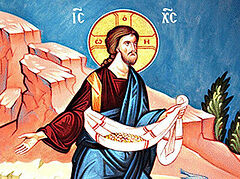The same day went Jesus out of the house and sat by the sea side. And great multitudes were gathered together unto him, so that he went into a ship, and sat; and the whole multitude stood on the shore. And he spake many things unto them in parables, saying, Behold, a sower went forth to sow; and when he sowed, some seeds fell by the way side, and the fowls came and devoured them up: some fell upon stony places, where they had not much earth: and forthwith they sprung up, because they had no deepness of earth: and when the sun was up, they were scorched; and because they had no root, they withered away. And some fell among thorns; and the thorns sprung up, and choked them: but other fell into good ground, and brought forth fruit, some an hundredfold, some sixtyfold, some thirtyfold. Who hath ears to hear, let him hear.
The mysteries of the Kingdom of God proclaimed by Christ our Savior were deep and sublime; not everything could be directly and openly communicated to people infected with prejudices and false opinions about the coming Kingdom of the Messiah. But the Lord did not want to leave even His enemies without instruction and admonitions. His Divine love invented, in His wisdom, another means of expounding His teaching in a form accessible to the people: parables. The word parable in its general, broad sense, means figurative speech, but in a special sense it means a plausible, integral story from human life or nature, given in order to explain a truth of faith or a rule of spiritual life. God is the one Creator of the world, visible and invisible; and He created both according to His wisdom and goodness; and in both worlds He imprinted His divine perfections, His divine laws.
There is, therefore, a marvelous unity, a certain affinity between the visible world and the invisible world, and the visible world speaks to our heart, our mind about the laws of the invisible world. The heavens declare the glory of God, says the royal Prophet (Ps. 19:1). For His invisible things (God's), His eternal power and Divinity, says the Apostle Paul (Rom. 1:20), from the creation of the world are clearly seen being understood by the things that are made.
Thus, the whole visible world, with its sun and moon, light and darkness, sowing and reaping, birth and death, all people with all the various incidents of their daily life, in a word, everything that is accessible to our senses, is a striking parable, the great book of God, in which God has written in living images great spiritual truths to help our faith and understanding.
A parable is not a fable. Many improbable things are allowed in a fable; for example, the conversation of animals and even plants; the Lord did not use such fictions that did not agree with the laws of nature. Parables resemble those comparisons and likenesses that are found in proverbs. What a proverb expresses briefly in a few words, a parable depicts in a whole story. That is why wise people have used parables since ancient times when they wanted to portray a moral truth more clearly. Easterners especially like to speak in parables and figurative speech when it comes to spiritual subjects. But there are no parables in all the writings of men better than those we read in the Bible, and there are no parables in all the Bible better than the parables of our Savior, the Lord Jesus. They are important and invaluable for all ages and conditions. They are understandable to a small child, but there are many things in each of them that the most profound person can ponder.
“The Lord speaks in parables,” according to the explanation of St. Chrysostom, “in order to make His words more expressive, to clothe the truth in a living image, to imprint it more deeply in the memory and, as it were, to present it to the eyes.” A parable does not act on the mind alone, but also on the heart and imagination of the hearer, and therefore the truth, like a picture, is more easily retained in the memory. Although the listeners sometimes did not understand the meaning of the parable, nevertheless the parable itself remained in them as a good seed that sprang up as soon as the heart was touched by the life-giving grace of the Spirit of God. “The parables of the Lord,” says one interpreter, “are a beautiful fabric, devised and composed by His love and wisdom, partly to cover the truth for a time, so that it does not blind someone's weak eyes, partly to excite attention to what is hidden under this mysterious veil. Their as if darkness, their as if mysteriousness attracted them to Jesus for their approval.”
The same day, writes the holy evangelist Matthew, on the day when the Lord rebuked the Pharisees who demanded a sign from Him, from the house where He was told that His Mother and brothers were looking for Him, Jesus sat down by the sea, on the shore of the sea of Galilee. “He sits down by the sea,” says St. Chrysostom, “to catch and draw to Himself people who are on earth.” Crowds gathered on the sloping shore of the lake: and a great many people gathered to Him. The number of listeners was so great that they pushed the Divine Master aside, so He entered the boat and sat down. He found it necessary to enter the boat and sat down on the highest part of it – so that no one was behind Him, but all was before His eyes: and all the people were standing on the shore. And, having separated somewhat from the shore, He began to teach the people, teaching them many parables.
In the entire Gospel there is not such an abundant collection of parables, such a full thread of the most precious pearls, as is found in this, the thirteenth chapter of the Gospel of Matthew. Not far away on some nearby hill, the sight of a farmer who sowed the cultivated field might have presented itself to the Savior’s gaze. And so, as if pointing to him, the Lord began His first wonderful parable, saying: Listen! Behold, a sower went out to sow seeds; and when he sowed, another fell by the road, where the ground was not plowed, and therefore the seed could not sink deep into it, and was trampled by passers-by, or became an easy prey for birds that in the East accompany the sowing farmer in whole flocks and try to peck the bread grains thrown by him: and the birds swooped down and pecked at it. “The Lord did not say that the sower deliberately left it by the wayside,” St. Chrysostom notes, “but that the seed fell by itself.”
There was another seed, which at first promised a harvest, but in the end also disappeared: another fell on stony places, where there was little land, where only a thin layer of soil lay on a solid stone, and it soon rose and a seedling appeared on the surface, but because the ground was shallow, the stone did not allow the root to go deep. When the sun rose, the plant could not resist its scorching rays and immediately faded, wilted, and, as it had no root to nourish it with moisture from the soil, withered away. Another fell into the thorns, which could well happen there, because the fields were often separated by a thorn hedge, and the thorns grew, and grew together with the sprout of wheat, and choked it, because, having grown, the thorns deprived it of air and light, absorbed all the juices in the soil with its roots, and the seed was lost to the farmer.
But not every seed perishes. The farmer harbors the hope that, with God's blessing, his work will not be in vain, that some of the seeds will reward him for this hard work. And indeed, some fell on good soil and brought forth fruit: one a hundredfold, and another sixty, and another thirty, depending on how much the soil was fertilized and prepared for sowing. A hundredfold harvest in the East is not unheard of: And Isaac sowed in that land and received a hundredfold of barley that year: Thus, the Lord blessed him (Gen. 26:12). At the conclusion of this parable, the Divine Master proclaimed: whoever has ears to hear, let him hear! Whoever desires to know the truth, whoever does not silence the voice of conscience within himself, let him ponder the meaning of this parable and apply it to himself…




